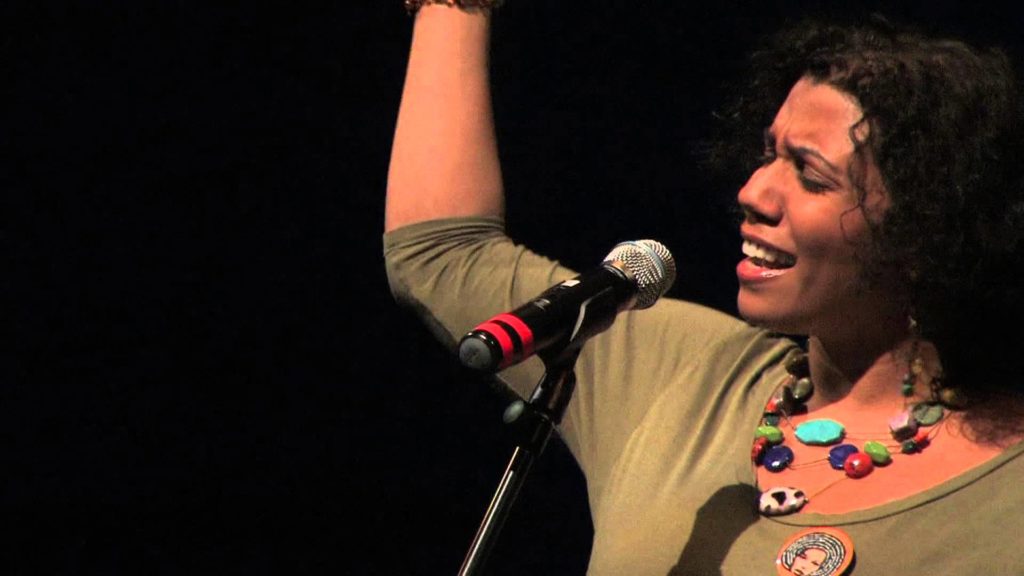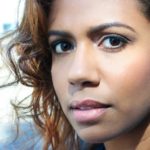You sound white! You speak so well. You’re very articulate. As I was coming up in the world, a brown-skinned Bronx born Boricua at a time when my appearance and the sounds coming out of my mouth didn’t compute for many people. I’ll never truly know what they expected to hear, but I remember what it felt like to receive those words. You sound white! You speak so well. You’re very articulate. As a young woman, I made the grave mistake of equating education to whiteness. I thought Well if speaking intelligently means I sound white, what can I do? It was nothing more than a weak defense mechanism. A young me trying to protect a still fragile ego. It didn’t occur to me at the time to weigh those words as insults. However, it did create a sense of shame in who I was, that I would wrestle with throughout my youth. It wouldn’t be until I was a young adult navigating the collegiate space and later as an adult that I would break the colonial cycle and reclaim my voice.
As a child, I wanted to know. My mind craved knowing. So I read. Libraries, books, reading, they take up so many of my childhood memories mixed in with visits to the beach, hanging out with my grandpa and cleaning on the weekends with my mom. I can’t put my finger on how my speech or my language evolved. I thought I spoke just like everyone else did. However, it was everyone else that commented on my speech with those phrases that would question my voice, at times silence me and that I would eventually break-free from. Those words interwove themselves in the complexity of my Puerto Rican identity and my mixed race appearance, as I learned to discover and rediscover myself within the white-black dichotomy of the United States. But I learned. I learned.
Everything I consumed began to shape me. Things I had no language for came to life for me. Thrilled by what I was learning and being a natural Leo, I was a talker. Until. You sound so white! It hurts, so badly especially from kin. That my voice, my Spanish accented, Bronx girl voice sounded white to people. I would lose it. I would lose my voice. A future performer. Spoken word poet. An educator. I didn’t want my identity wrapped up in whiteness and yet it seemed a favorite phrase among peers and others. My journey was stunted by the shame of this phrase. I hated being told I sounded white. I knew I wasn’t a valley girl or even a valley girl wannabe. So why did anyone think to say these words, to me? Because I probably did sound white. My accent isn’t as think as I like to think it is. My Bronx girl swag probably isn’t as refined as it should be. So… was I so white? NO! Later I would realize that sounding white, being white was just hurtful, destructive labels.
However, in my youth there was still a conflict between all of the things we raised to believe were “white” and all of the things we were raised to believe were “other.” Sounding smart, was definitely a white thing to do. I began to question, was it something to aspire to? Could a brown child find themselves in academia without it being viewed as aspiring to whiteness? It didn’t matter how many Black or Brown scholars, inventors, or artists existed. We didn’t see ourselves regularly in any curriculum and so reading, writing, and other academic pursuits remained in the white world and if you were brown and moved in that direction – you wanted to be white.
As I grew older, You sound white! Became You speak so well. Speak so well? As compared to what? Today we’d label that a micro-aggression, back then I would have called it a backhanded compliment. Whenever this phrase made it into my world, I always felt my gut tighten just a bit. I knew what it meant. Still, I was struck that it was being said to me. What was that about? Was I overly confident? Was I expected not to be well spoken? There were moments in my youth when these words shamed me. Of course, I spoke well. I was confused and sometimes angered by the insinuation. I remember once I received feedback from an instructor about a paper I submitted after completing an internship and she wrote something along the lines of your writing is on par with that of the average high school student. I was seventeen.
She wasn’t in front of me when I read the comments, I don’t know if I was gutsy enough at the time to have spoken up for myself. I hated that comment. Even if it was perfectly true. In my mind, it read as a surprise within the context of the entire feedback on my piece. I was always a solid writer while in school. I did well in my English classes. It was an English teacher who wrote my letter of recommendation for college, which I still have a copy of somewhere in my files. So I wondered what the instructor was expecting. A poorly written essay perhaps? I didn’t know why my intelligence or my manner of speaking surprised people and I was especially frustrated when my peers used it to create space between us, to create a difference.
As I matured into adulthood the words changed. You’re very articulate. Well certainly everyone… most people think about what they’re going to say before they speak… no? There’s no meaning, no comprehension, what conversation can be born of this remark? The argument is lost after a comment like this. It’s a response without responding and because it feigns a compliment a different mind might be satiated by this. In a professional environment, how do you advance? As I got older, you speak so well became you’re very articulate. Yet another backhanded compliment. There were times when I wanted to accept it as a compliment but I couldn’t. I’m in love with words. Perhaps it was the growing poet in me. So I tend to choose my words very carefully. When I was younger, perhaps foolishly I thought this was the goal. To be articulate. To be able to engage in conversation with adults about culture, politics, art etc.
Perhaps I am articulate and should own it. However, the growing shame of being a well-spoken brown girl made that adjective one of discomfort. I knew it would allow me to code-switch. I knew it would allow me to navigate white, professional or academic spaces perhaps easier than others. Yet I knew that when someone felt the need to point out that I was articulate it was more than just a compliment about how I spoke. I questioned the need of being able to code-switch. I questioned why this was valuable to brown people. Was I more articulate in some spaces and less in others? Was I pushing away my friends and family by speaking in a way that made them uncomfortable? That made me different? Was I looking for acceptance in academic spaces? The comments made me question myself and this created a space for me to grow.
It is a colonial mindset that equates intelligence with whiteness. I would learn that my own mind would have to go through its own process of decolonization if I were ever to release myself from the hold of these words. When I rediscovered my voice and started challenging these ideas for myself I started to own my intelligence. I reclaimed my identity. How I used my voice in telling marginalized stories, in advocating for the youth of color, in pushing back against the norms that have historically dictated that all things academic are necessarily white I have been able to dismantle the shame I felt growing up. I have been able to release the weight of those phrases and do the work that needs to be done. I have also discovered and learned to value other types of intelligence. This has allowed me to grow, it has reconnected to people. I don’t hear those phrases anymore and I’m glad for it. Having been able to release this has allowed me to better educate teens today.
Though not a crime against humanity I was fractured when I learned about all of the Puerto Rican writers that had existed for decades, that I was unaware of until I became a college student. Perhaps this is the reason my brown skin and my big voice was disquieting for so many. Perhaps it was the lack of Puerto Rican writers and speakers visible in the world I was living in. Perhaps if everyone knew, then they wouldn’t be so surprised. This would be the turning point in a decision that would remain at the heart of the world I do today with youth. I took a personal vow that I will fill every student’s experience with historically marginalized writers of color especially women writers. I would make sure that they the characters they read were rich and complex and reflected many of their own lives. This mission I gave myself, was not just to honor the voices of the past and the present. It was to give my students a space to honor their own experiences. I wanted my students to see themselves in the curriculum in a way that I never did. I want them to learn the things that I didn’t learn.
The young women are especially important at this moment. When I think of the silence breakers of the #MeToo Movement, I wonder how much of that is connected to the social norms of silencing women in general. I think about how we suppress and silence women’s voices, especially the voices of women of color. I think about how we can raise and uplift those voices through academia by honoring people who look and sound like them in the curriculum. I think about how we can create spaces for them to honor each other’s voices. This is what my work with youth is about. They are too young to remember that their existence is still very much political. Two of my fondest classroom memories came from Dominican female students. Student A though much more outspoken than I was at her age, struggled to understand and accept her blackness. At one point in the semester, she shouted “I’m black” and everyone in class applauded.
It was an amazing moment. I like to think that something that happened in class that semester opened her eyes to the complexity of race and ethnicity for the Spanish speaking Caribbean. That Student A was starting to open her thinking to ideas that had been suppressed for decades by a dictatorship. That the more she says “I’m black” the more pride she will feel in the statement. Another fond memory was with Student B. In a year-end reflection she discussed the impact reading Krik? Krak! by Edwidge Danticat had on her. She remarked on the importance of being a Dominican woman and honoring the experiences of Haitian in the Dominican Republic and fighting Trujillo’s legacy of anti-blackness. Both young women grew personally, from an academic experience. Both young women began to see the world with different eyes. Both young women are more analytical, more empathic and more critical of the world they live in. Both young women are learning that silence is not an option.
This is why I do what I do. So that one day, if these young women are ever confronted with the micro-aggressions I was confronted with as an adolescent, they will have the tools to speak up for themselves and own their brilliance.
******************************************************************************************************************************************
J.F. Seary is a Nuyorican poet and actor. She has performed at the Nuyorican Poets Café, the Bowery Poetry Club, and Le Poisson Rouge. She has performed in American cities such as NYC, Chicago, Philadelphia, L.A., Grand Rapids, and Orlando. She has also performed in London, U.K. and San Juan, P.R. In addition, she has toured colleges across the country with her solo poetry show and with Kraal Charles Media’s ensemble HerStory. J.F. Seary has performed in both classical and contemporary theatrical productions including; Shakespeare’s King Lear, A Midsummer Night’s Dream and As You Like It. Contemporary plays include Vivisection, In The Cypher, Soledad Speaks, Of Mothers and Men and Latin Lives. J.F. Seary is currently writing for the web-series Jaded: The New York Effect and theatrical production of HerStory. She continues to live and work in NYC. J.F. Seary is humbled and eternally grateful for the continued love and support. For more information or bookings: www.jfseary.webs.com.
 Wendy Angulo Productions
Wendy Angulo Productions





